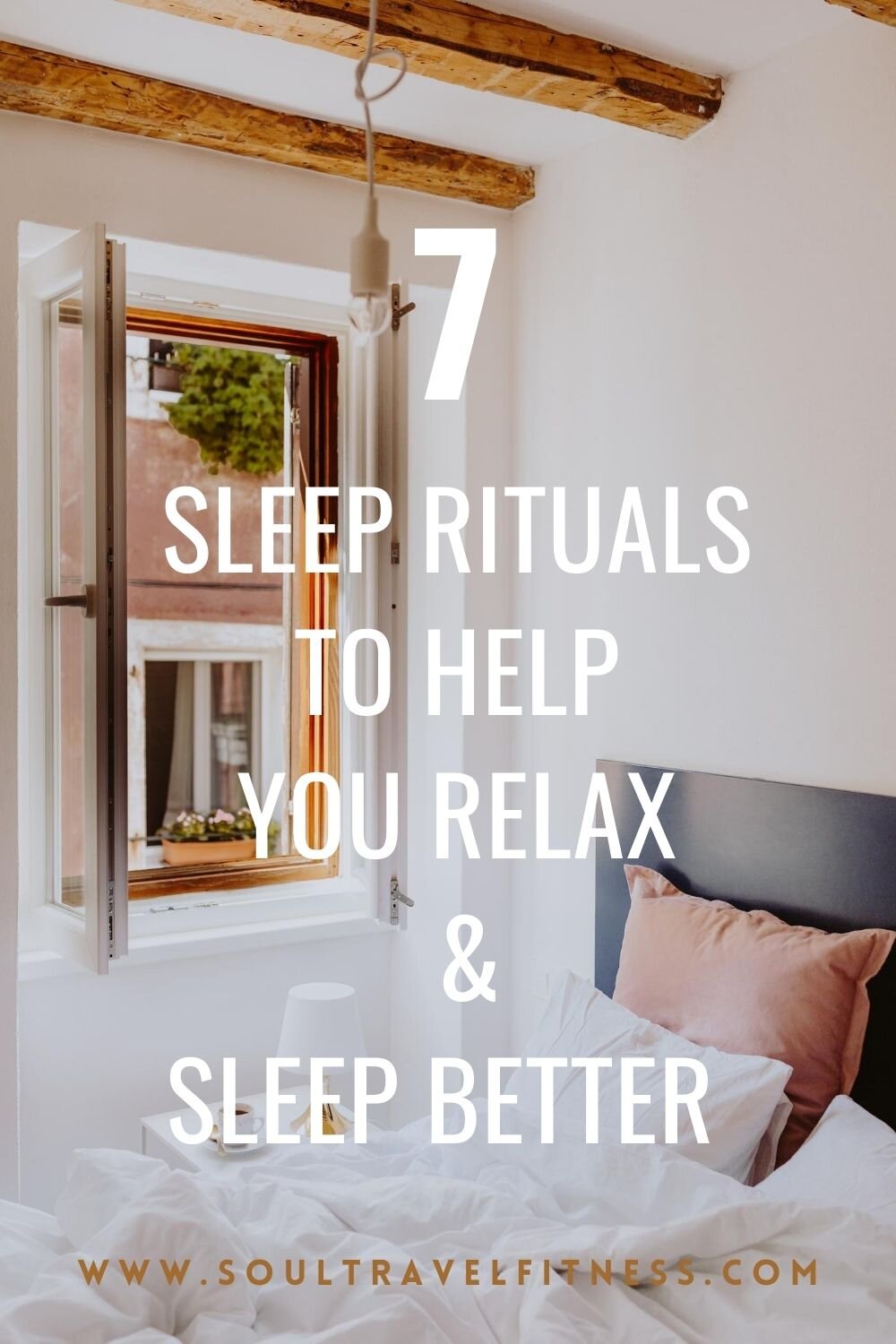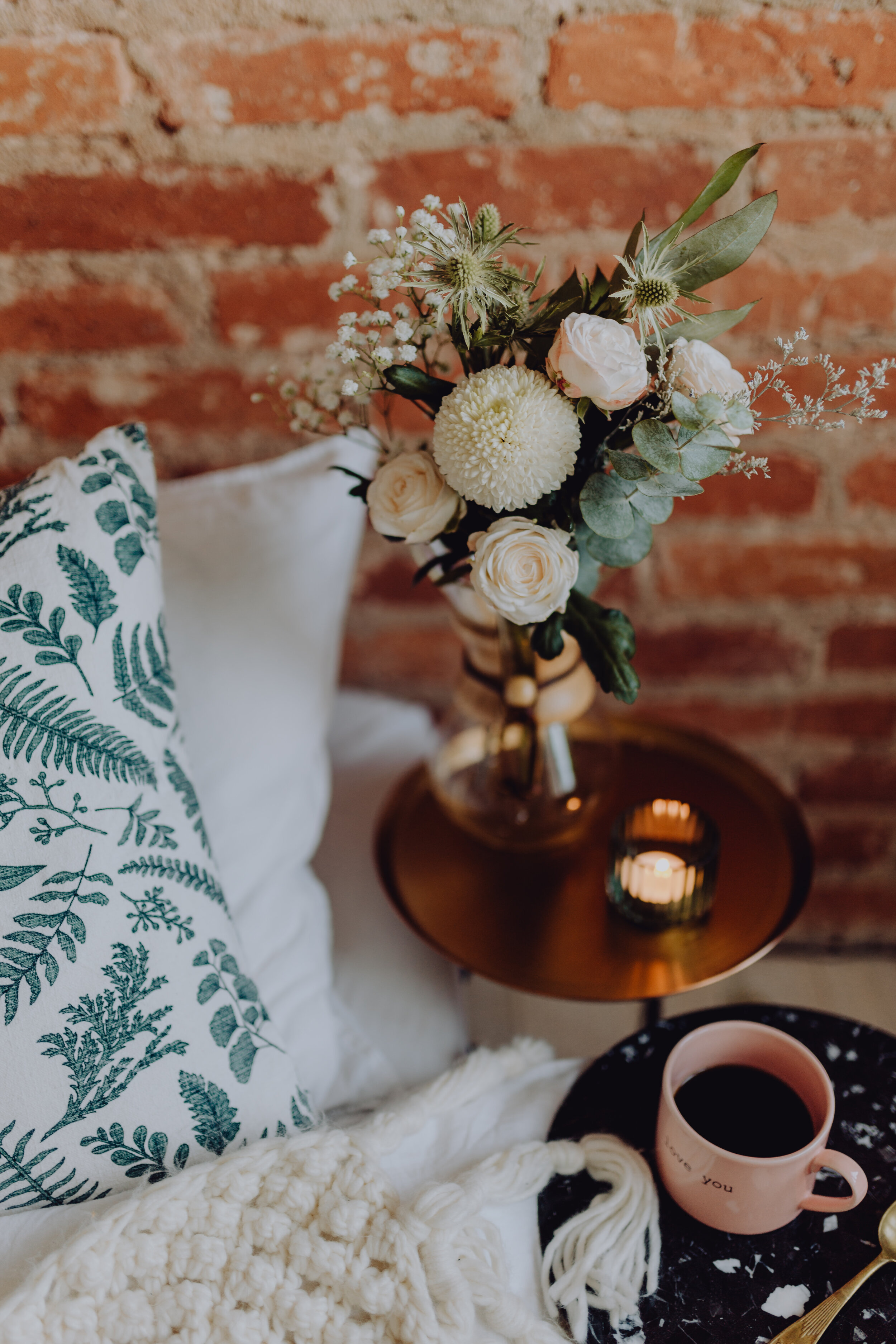7 Sleep Rituals to Help You Relax and Sleep Better
/There are some people who can function on only 4-6 hours of sleep each night and there are some people who need at least 8 hours to function as a human being. I’m the latter.
Sleep is the foundation of health. When you get enough quality sleep, your body rewards you for it and you feel great. But when you don’t get as much sleep as you need or you’re tossing and turning all night, your body lets you know about it and you feel rough.
You might not be getting enough sleep due to poor sleep habits. If you think this could be the case, take a look at 7 Sleep Habits You Need to Ditch. Or the reason you’re not getting enough rest might be beyond your control such as the pandemic, work schedule, kids, loud neighbors...you get the point.
We all need sleep. And when we have good sleep habits, our overall health dramatically improves, so it’s definitely something worth investing in.
The beautiful part of what I like to call SLEEP RITUALS is that they allow you to unwind and relax before your head even hits the pillow. This way, you start benefiting from a good night’s rest before you’re actually in bed.
If you’re struggling to get as much sleep as you need, add these 7 sleep rituals into your evening routine. I guarantee you’ll see the difference almost immediately!
1. Unplug from technology: An hour before you head to bed, stop using tech. Turn off your TV, close your laptop and put down your phone. So you’re not tempted, tidy your TV remote away, put your laptop back where it belongs and charge your phone in a separate room.
It’s easy to get yourself worked up when watching a suspenseful show, replying to emails or checking the news on your phone. When you do these things shortly before it’s time for bed, your head will be racing when it hits the pillow. Dedicate the last hour of your day to doing relaxing, calming things that support a peaceful night’s sleep.
2. Curl up with a book: It’s time to crack open a book and curl up in bed for the evening. Read for pleasure. Read for enjoyment. Read for relaxation. Just pick up a book, read and fall asleep. It really is that easy.
Reading transports your thoughts away from your busy day and lets you feel calmer by relaxing your mind and muscles. If you’re not much of a reader, you simply haven’t found the right author or genre just yet. They’re out there — just keep looking.
I love keeping a book on my nightstand so it’s there waiting for me like a best friend when I turn in.
Whenever I’m traveling, I prefer to use Audible because it means I don’t have to carry loads of books around with me in my suitcase. Climbing into bed and hitting play on my Audible book allows me to get lost in the story and drift off to sleep.
Reading in bed not only helps with insomnia, but it also reduces stress and improves your memory. A BIG yes to all of these!
Some of my favorite books to fall asleep with are: The Alchemist, Big Magic, The Four Agreements, Becoming and Untamed. If you’re feeling sleepy while reading this, author of Why We Sleep, Matthew Walker, would tell you to honor your body and simply fall asleep and I completely agree with him.
3. Pour a cup of herbal tea: I love the ritual of putting the kettle on the stove, grabbing my favorite mug and pouring a warm cup of tea. Incorporating tea into your bedtime routine encourages you to unwind, reflect and be mindful.
Chamomile, peppermint and lavender are some of my favorite teas to have before bedtime. Green tea is also a good nighttime option. But, if you’re anything like me, make sure it’s decaf or you’ll be up all night. There’s nothing worse than accidentally having caffeine before bedtime and wondering why you’re tossing and turning for hours or simply staring at the ceiling.
Want to relax and reduce anxiety? Sip on a cup of bedtime tea and you’ll be saying hello to sweet dreams in no time.
Tip: If having a full cup of tea means you wake up in the middle of the night to use the bathroom, consider having just half a cup instead.
4. Soothing scents: You might be skeptical about how a scent can help you sleep. But I’m here to tell you that having soothing scents in your bedroom is the most effective wellness routine for better sleep.
The best part about integrating soothing scents into your bedtime routine is that it takes hardly any effort. The most popular way to create an aromatic room is with a diffuser and essential oils. A diffuser is a device that breaks down oils and sends them into the air for a calming effect.
There’s nothing better than getting home after a long day and using a diffuser. You smell the scent of lavender and instantly know it’s time to unwind and begin your nighttime routine.
If you don’t have a diffuser, it’s not a problem. Light a scented candle or spray a lavender scent on your pillow for the ultimate calming down and drifting off experience. The thing about scents is that everyone has their personal favorites. So explore — mix and match essential oils until you find what works for you. Have fun with it!
5. Journal away: If you’re anything like me, you have millions of thoughts running through your head all day long. The act of physically writing down your thoughts before you sleep allows your body to download the information and disconnect.
Don’t think too much about getting things just right when writing. Focus more on letting your thoughts flow. You can write about your day, unfinished tasks, ideas...anything. My nightly ritual consists of writing down a gratitude list of 5 things I’m grateful for.
When I’m too tired to make a written gratitude list, I make one using my fingers instead. I tap each finger as I say what I’m grateful for.
Today I’m grateful for feeling the breeze in the air on this hot summer’s day, taking a short catnap in the afternoon, buying fresh mango from a fruit stand on the way home, talking for hours with a best friend in Shanghai and for my Spanish class because things are finally starting to click.
6. Meditation: Meditation is all about connecting the mind, body and spirit. Mindfulness meditation encourages you to focus on the present while letting your body relax. Studies show meditation reduces insomnia, fatigue and depression.
The first way I teach clients to meditate is through mindful breathing. This is where you put one hand on your chest, one hand on your belly and feel your hands rise and fall. At the same time, notice your breathing and how it feels in your nose, mouth, throat and lungs.
Another kind of mediation I recommend is a body scan which allows you to connect with your body and be fully present. Start by feeling the sensations in your feet, from your toes and soles up to the top of your feet. Let your feet fully relax and repeat the steps on your ankles, legs, back, torso, chest, shoulders, arms, face and head.
A body scan isn’t just something to do before bed. It’s a meditation practice that can ground you at any point during your day.
If you want more support, there are loads of guided meditations available online. My amazing friend and meditation teacher, Lacy Young, has her own meditation app called SHIFT. There’s an entire section dedicated to morning and night meditations on her app. I definitely recommend you download it. You won’t be disappointed.
Calm is another popular app with guided meditations for sleep. Some of the meditations are free and some you can only access with a paid subscription. Not only are the meditations wonderful to help you fall asleep to begin with, but they’re also really helpful for when you wake up in the middle of the night and can’t get back to sleep. Just make sure you only pick up your phone to use the app. Resist the urge to scroll through social media or check your email.
7. Create consistency: Whatever your sleep routine looks like, make sure you do it consistently. Repeating the same steps over and over creates a routine your body will start to crave. The more you’re consistent, the easier it will become.
Let’s say you typically fall asleep at 10pm every night. An hour earlier is a good time to start winding down and beginning your bedtime routine. By practicing your daily ritual, winding down at 9pm and going to sleep at 10pm will soon come naturally.
Other ways you can create consistency with your bedtime routine are by doing simple tasks, such as making your bed in the morning. It only takes a minute and starts your day off on a positive note. There’s something incredibly comforting about pulling down freshly made covers and climbing into bed at the end of a long day. Maybe it’s just me, but I always feel like I sleep better when my bed is made.
A beautiful mantra is also a loving way to end the day. Here are some of my favorites:
● My body is a source of calmness.
● All experiences help me grow.
● Where I am is where I am meant to be.
● I love and approve of myself.
● I breathe in peace and exhale tension.
Creating a sleep ritual not only helps you feel relaxed, peaceful and rested, but you’ll also begin to notice other areas of your life improve. I’ve had health coaching clients who have upgraded their sleep habits and as a result experienced weight loss or improvements in their work and home relationships. Getting the right amount of good quality sleep for your body helps you improve your physical, mental and emotional health.
Lovelies do you have a SLEEP RITUAL? How do you wind down from the day? Would love to hear if you have any sleep rituals that I forgot to mention. Comment below.
Wishing you alll sweet dreams.






